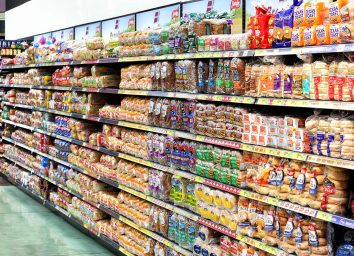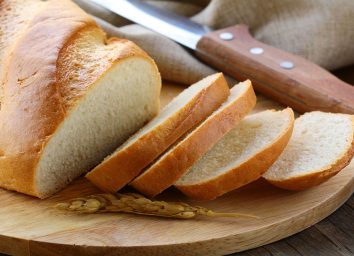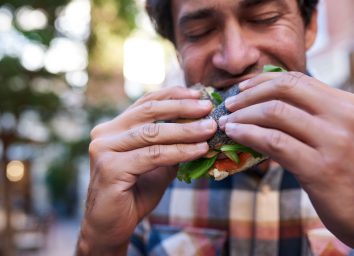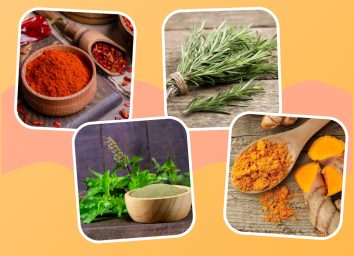One Major Side Effect of Eating Bread, Say Dietitians
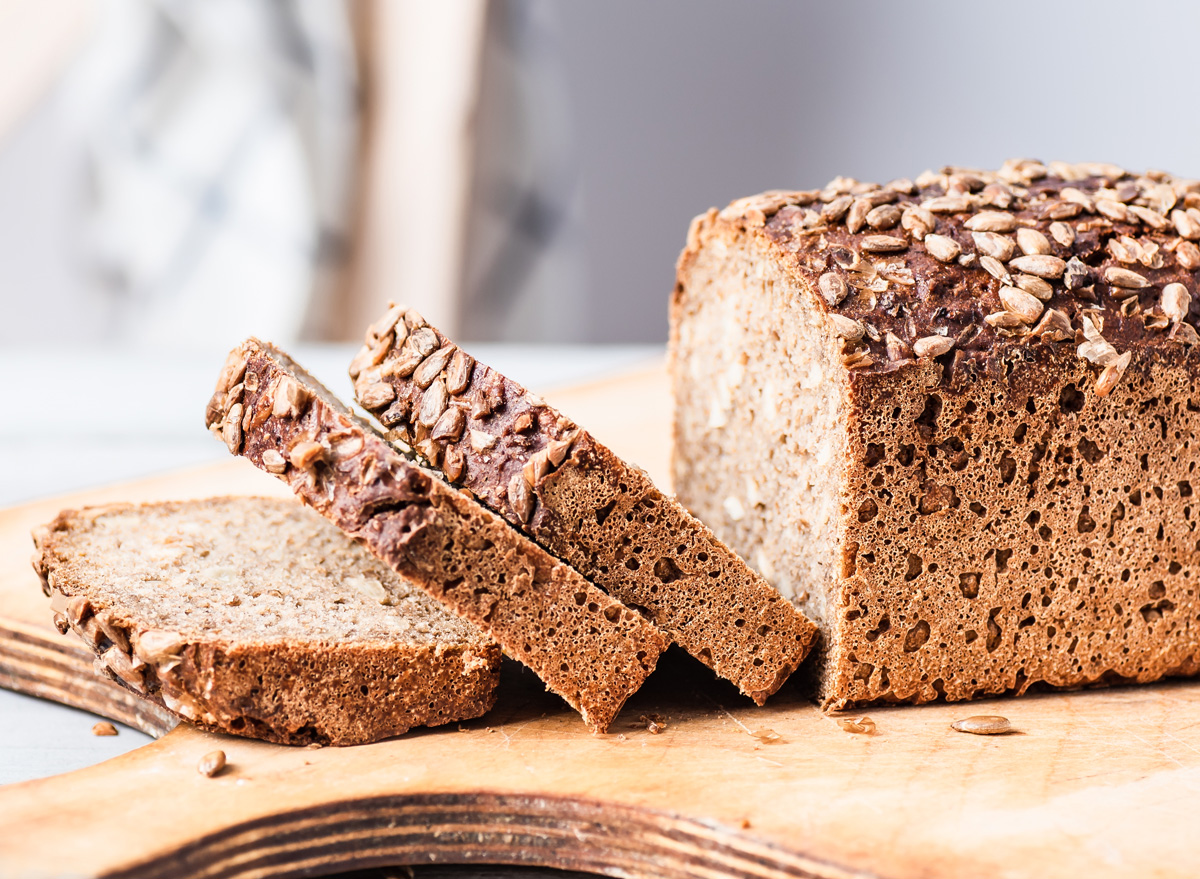
Next to pasta, bread is probably the most vilified of the carb group—and for good reason. The ultra-processed bread you buy in America is nearly devoid of the beneficial fiber that comes naturally in whole grains and instead contains a slew of ingredients you'd never find in a baker's pantry: DATEM, monoglycerides, cellulose gum, monocalcium phosphate, soy lecithin… you get the idea.
To make matters worse, store-bought, ultra-processed bread is the fifth leading source of added sugars in the American diet—coming in ahead of classic sugary treats like desserts, breakfast cereal, and even ice cream. Yes, bread is a source of added sugar!
"Some breads, despite being labeled 'whole grain,' have excess sugar which provides empty calories and can cause blood sugar and insulin to rise," says Tina Marinaccio, MS, RD, CPT, a New Jersey-based Integrative Culinary Registered Dietitian Nutritionist. Marinaccio notes that you have to keep an eye on labels, as many brands now use natural sweeteners, but that doesn't mean they're any better for you than the classic high-fructose corn syrup.
"Don't be fooled by empty-calorie sweeteners that sound healthy like coconut sugar, brown rice syrup, and cane sugar. Sugar is sugar by any name. For every 4 grams of sugar on the nutrition panel, that is one teaspoon of sugar," she says.
There is one surprising, positive side effect of eating (healthy) bread: you'll get more fiber in your diet.
But like many foods, bread can vary in quality and nutritional value, and choosing the right loaf of bread can actually have incredible health benefits. In fact, the dietitians we spoke to agreed that there's one major benefit of bread you'd never guess, but need to know: less-processed, whole-grain bread is a great source of fiber.
"Fiber is a key nutrient that is significantly under-consumed in the diets of Americans. Less than 1 in 10 people eat the recommended daily amount of fiber. Those who eat bread and cereal, especially some with bran and whole grains, are more likely to meet the fiber requirement," says Stacey Krawczyk, MS, RD, the consulting Registered Dietitian for the Grain Foods Foundation and President of FoodWell Strategies.
In fact, "according to a recent Nutrients study, both whole grains (complex carbs) and refined/enriched grains combined contribute approximately 54% of all fiber intake in the American diet," says Krawczyk.
Why you need fiber from bread.
While bread is often the first thing to go when we're starting a diet, Krawczyk advocates for keeping this whole-grain food as a part of your diet: "Those who omit [the bread and cereal] group altogether are less likely to meet the fiber requirement. Plus, they'll have no foods that deliver the special nutritional benefits of breads and cereals such as cholesterol-lowering B-glucan," she explains.
The reason why bread being such a good source of fiber is so important is that "dietary fiber is essential for gut health and satiety," says Claudia Hleap, MS, RD, LDN a registered dietitian and owner of Hleap Nutrition, a nutrition practice in Philadelphia. "Fiber also aids in blood sugar management and appetite regulation. When trying to make the healthiest choice between breads, aim to choose the one highest in fiber and protein. This will make the bread a more filling choice as a part of your meal."
Fiber isn't the sole benefit of eating healthy bread.
"When purchased from a bakery (or baked at home), bread can be a good source of whole grains, complex carbohydrates, dietary fiber, and more. Whole wheat flour and other flours made from milled whole grains provide nutrients that benefit our health. Whole wheat flour is high in fiber and is a good source of iron, as well as many of the B vitamins. Some breads can also contain nutrient-rich ingredients such as nuts, seeds, and dried fruit." says Abbie Gellman, RD, a registered dietitian and chef at the Institute of Culinary Education.
How to buy the right bread to reap its high-fiber benefits.
As we mentioned in the beginning, most store-bought bread in America is highly processed and contains little to no fiber and upwards of 7 grams of sugar. (Related: The 18 Unhealthiest Breads on the Planet.)
So it's important that you purchase the right kind of bread to reap the benefits.
"If purchasing packaged bread, it is a good idea to choose one from the bakery area (versus a mass-produced bread item found in the 'bread aisle.')," recommends Gellman.
And make sure you're looking at the label for "whole grains."
"Consumers should make sure their bread is from whole grains. A whole grain is an entire seed from a plant that contains the bran, endosperm, and germ. Since it's the entire grain intact, it contains all the nutrients from each part. Refined grains do not have all the pieces of the grain's anatomy. Most refined grains have the bran and germ removed during the milling process. Compared to whole grains, refined grains have 25% of the protein and half the nutrients," says Gellman, adding that you should also be making sure that you don't see ingredients like added sugar and refined flour.
In addition to the 8 Healthiest Breads to Eat for Weight Loss, Marinaccio recommends whole kernel breads like Alvarado Street, Ezekiel Bread, and good organic whole rye breads like Mestemacher. "These start with the intact grain, and contain the bran, germ, and endosperm, preserving the fiber, B vitamins, antioxidants, and vitamin E," she says.
The takeaway
Like many store-bought foods, the quality of a food will make or break its health benefits. While opting for an ultra-processed loaf of bread may contribute to your added sugar intake and spike your blood sugar, choosing a whole-grain loaf will actually add to your daily fiber intake: something most Americans are deficient in. If you're not sure whether you need to up your fiber intake, check out these 9 Warning Signs You're Not Eating Enough Fiber.
For more healthy eating news, make sure to sign up for our newsletter!
